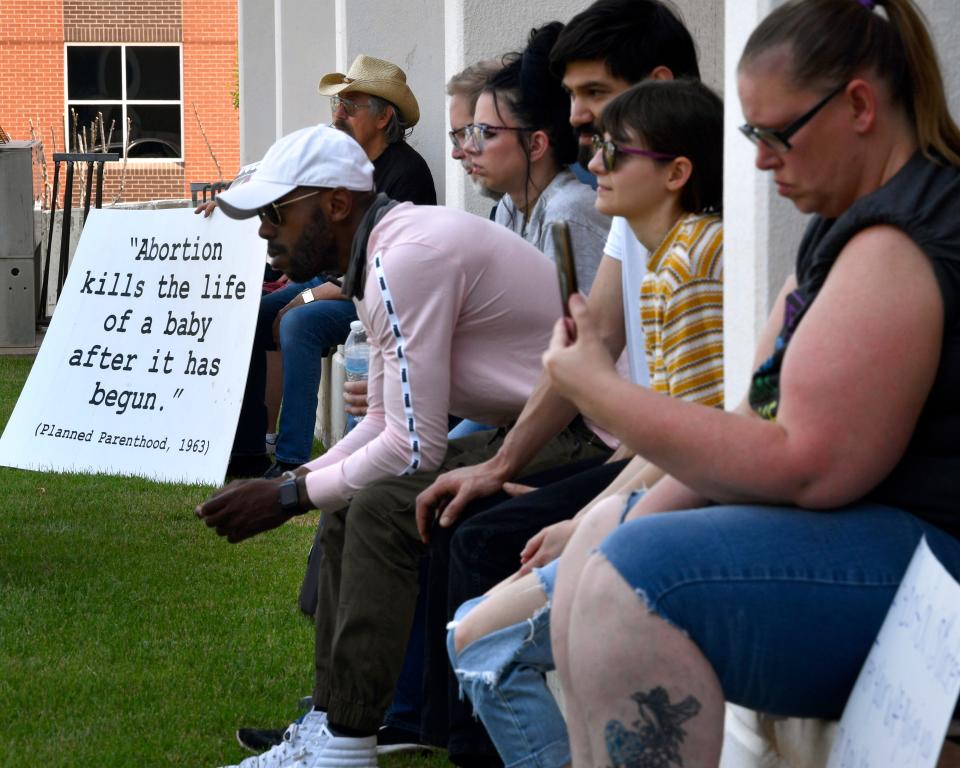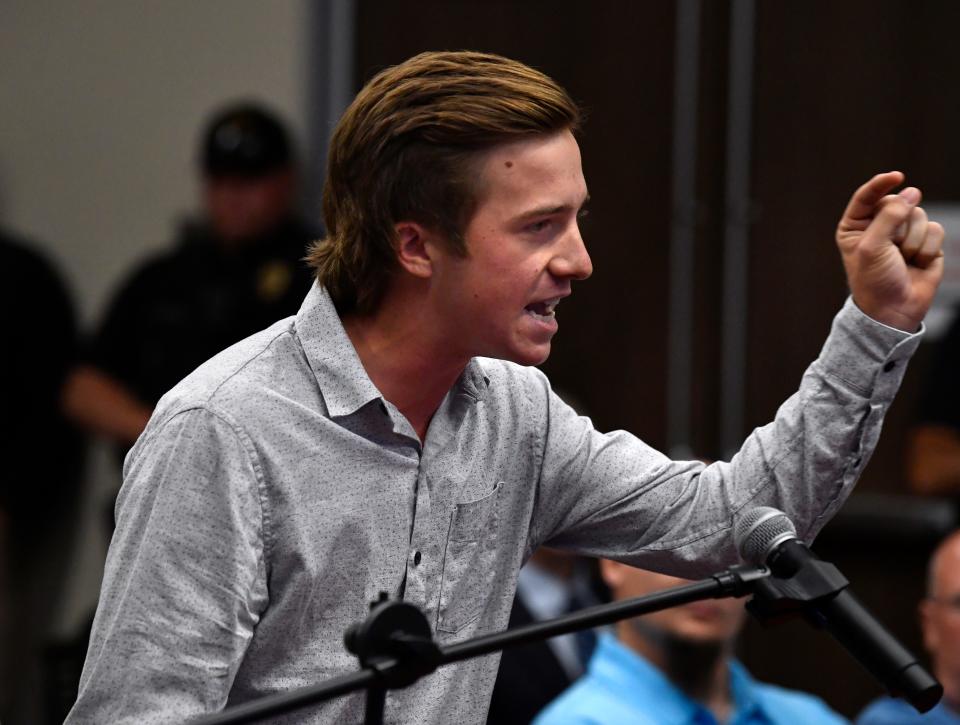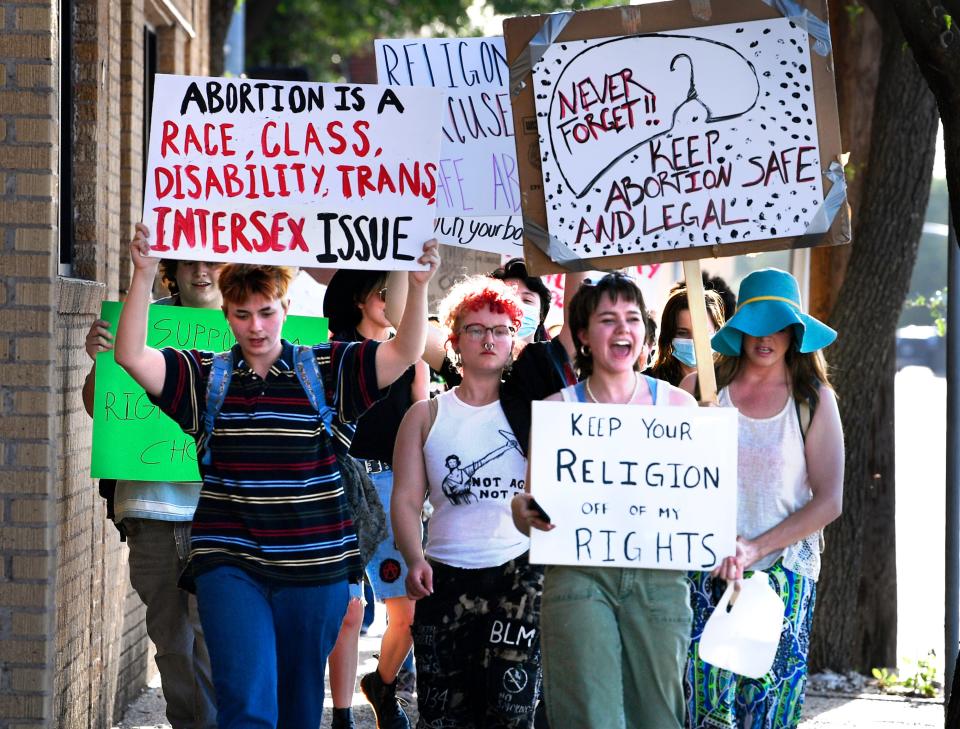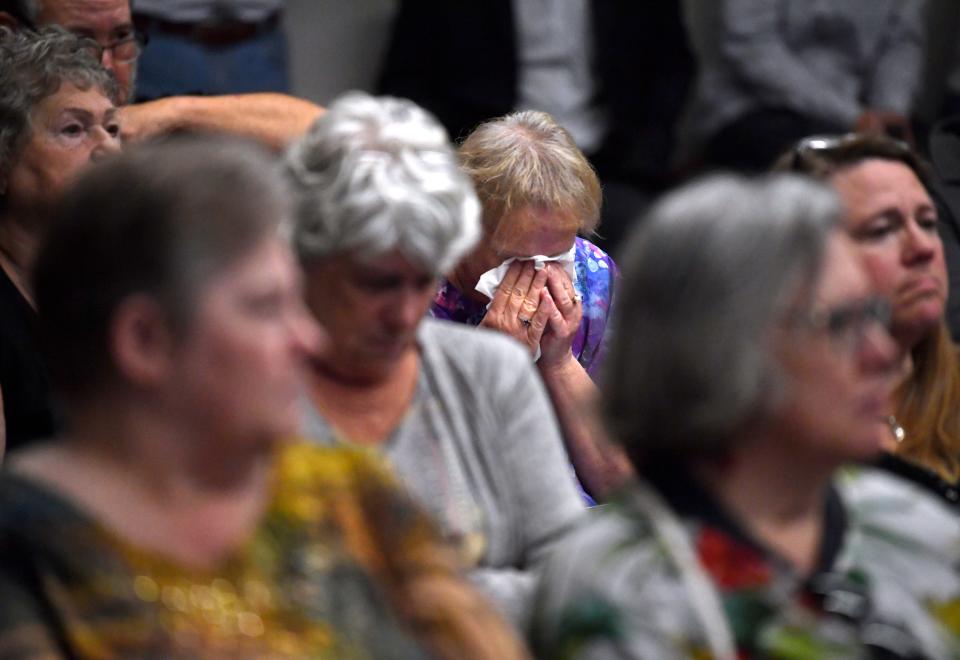Legal perspective: McMurry prof says strategy, dreams drive ordinance, but at what cost?
The very idea of a "sanctuary city for the unborn" is politically contentious, especially in the current climate, said Dr. Paul Fabrizio, a political science professor at McMurry University.
Led by a group of local churches and supporters, and driven by a petition drive that ended up with an ordinance being presented to the Abilene City Council last month, the issue will go before voters in November.
Those who spoke at recent council meetings were almost universally for the ordinance, a fact that doesn’t surprise Fabrizio, who said some individuals who might have have spoken in opposition may have felt too intimidated to participate.
“I think the concern that people have if they’re opposed to it is justifiable,” he said. “We live in an era, unfortunately, that is hyper-partisan, where doxing takes place on people who oppose things. And there can be in local politics, here just like anyplace else, nastiness at times. That's because this is a highly emotional issue.”

Building a movement
Fabrizio said Texas’ “Heartbeat Act," which bans abortions after roughly six weeks, comes across in its text as the dream of some legislators who “didn’t expect it to pass and be held up by the courts.”
“It did, much to their surprise,” he said. “So they're continuing that in subsequent other ordinances at the local level. They feel like they have momentum, and they're moving forward.”
Abilene's ordinance is based on work by Mark Lee Dickson of East Texas Right to Life and attorney and former Texas Solicitor General Jonathan F. Mitchell.
Mitchell and state Sen. Bryan Hughes worked together in 2020 to craft what became known as the "Heartbeat Act," which shares many similarities.
The law effectively bans elective abortion after detection of a fetal heartbeat and deputizes civilians to enforce it through civil lawsuits, a component that has made it immune to a number of court challenges.
Fabrizio said there been a “gradual movement” on the national stage among conservatives to try to change the scope of abortion laws, including a drift toward removing provisions for rape or incest from proposed legislation and ordinances.
The question is, he said, what comes next?
“If you look at the national picture, there's some who are saying we need to go and stop certain kinds of contraception, as well,” Fabrizio said as an example. “So, there is this element of … sexual purity that's taking place in politics.”
Nonnegotiable
Fabrizio, who emphasized he is anti-abortion himself, said the local ordinance is different in tone from the Heartbeat Act.
“The heartbeat bill in the end is a result of legislators sitting and negotiating, mostly Republican,” he said.
But Abilene's ordinance, as written, has "no negotiations," Fabrizio said. It flatly lays out a plan, a “wish list” designed by anti-abortion proponents.
Wide net

The pace of the push behind the local effort is interesting, Fabrizio said, because abortions aren't being performed in the city of Abilene right now.
He’s also struck by the relatively wide net cast by the ordinance.
“This thing just doesn't go after women who want to have an abortion, but also those who support (them),” he said.
Proponents argue delaying the ordinance's adoption means babies will die in the interim.
Fabrizio said it is, of course, “possible that some woman is going to get pregnant between now and November and say, ‘I want to have an abortion.’”
But the threat of a woman having an abortion locally isn’t present, he said.
There is no Planned Parenthood clinic for example, in town, which to him gives at least some time for people to properly study the ordinance before its passage.
'Too long; didn't read'

Fabrizio said it’s unlikely many who support the base concept of a sanctuary city will take the time to read through all 18 pages of the proposed ordinance.
They may still support it in November, he said, because “people just like the concept of it.”
That's a scenario actually common elsewhere, said Fabrizio, who came to Abilene from California, where the initiative process is common.
He said it’s not an uncommon to have 30-page documents eventually become law there – even though many who helped an initiative along the way “don’t have a clue about what’s in it.”
“(You) sell the concept, you don't sell the details or sell the particulars,” he said.
When it comes to the sanctuary city ordinance, many supporters might be surprised if they sat down and read through the whole thing, Fabrizio said.
He was curious to see what business owners might say about the ordinance’s requirements regarding health insurance, while at an individual level he wonders about the fate of those who might “knowingly donate money to abortion funds and abortion assistance organizations.”
“Is that something that attacks people's right to freedom of speech?” he said. “Does that mean we're talking about Planned Parenthood? Are we talking about the American Civil Liberties Union? Are we talking about the Democratic Party? What are we talking about?”
Fabrizio also questioned the law enforcement components of the ordinance, especially whether residents would want to make enforcing those provisions a priority versus other, more pressing law enforcement needs.
He also questioned whether already-taxed district attorney’s offices would be able to devote resources to related cases.
The proposed ordinance does have severability built in, meaning if a portion is found unconstitutional, the rest of it is unaffected, he said.
Surveillance state?

Fabrizio reiterated the ordinance is essentially a “wish list” for pro-life groups.
“They want a total stopping of abortion, in all cases,” he said. “And that's why I have great concerns from a law enforcement perspective (and) also from a citizen perspective. What are we saying about each other? What kind of activity are we going to be monitoring with each other? A surveillance society is a logical outcome of this if the citizens decide to push it forward.”
Topics someone might snitch on, he said, include insurance companies, employers, transportation and when people write a check and to whom.
“How are you going to know this?” he said. “What kind of snooping is going to be necessary?”
Such surveillance, Fabrizio said could extend to making donations to pro-abortion candidates.
“If you donate to that candidate, are you are aiding and abetting an abortion?” he said.
It also could mean churches monitoring members to make sure “they’re all following the rules,” Fabrizio said.
Any potential litigation that springs from Abilene’s ordinance likely will not come from places it is similar to a sanctuary city initiative passed in Lubbock in May 2021.
That ordinance, about half the length of the one shown in Abilene, has withstood litigation, he said.
It may, instead, come from items added to Abilene's version.
“It wasn't what Lubbock approved, so it's very possible that there will be lawsuits related to Abilene," he said.
Another brick
As far as the religious impetus behind the ordinance, the state is supposed to be neutral “in a shorthand way,” Fabrizio said.
“It’s actually complicated, but it’s being neutral on the question of religion. Neither for or against it,” he said.
Thomas Jefferson wrote his letter in 1802 about a “wall of separation” between church and state, Fabrizio said.
The unresolved question is: How tall is the wall?

“Is it a big wall, like on the (U.S.-Mexico) border?” Fabrizio said. “Is it a little wall you can walk over? Is it a wall with a door going through it?’
The Supreme Court recently issued a unanimous decision against the city of Boston, which refused to fly a Christian flag over its city hall but allowed other groups to fly flags.
“The Supreme Court unanimously, liberals and conservatives alike, said, ‘No, you by doing that are treating religion negatively. And you can't do that neutrally,” Fabrizio said. “You can neither advance nor inhibit religion.”
Taking it to the local level, even if every member of the Abilene City Council was a Christian minister or pastor, the council could not advance pro-Christian ideas based on that faith, Fabrizio said.
But at the same time, the city can’t inhibit those individuals from practicing their faith.
“And so, it's going to have to walk a fine line,” he said. “But of course, it depends on the on the issue.”
The proposed ordinance, in general, is “carefully crafted to avoid freedom of religion (and) Establishment Clause questions,” Fabrizio said.
“But it is strongly supported by people who are coming from one religious perspective, and so, what do you do about that if you're uncomfortable with that?” he said. “What do you do about that if you oppose it?”
People supporting it can use all the religious arguments they want, and government can't stop them, Fabrizio said.
“So, if people find support for this legislation from their religious beliefs, more power to them,” Fabrizio said. “A politician, a city councilman could believe that his faith leads him to support that, as well. And again, that's fine. But can religion be advanced by this legislation? Can religion be inhibited by the legislation? The answer's no.
"So we’ve got to be careful about how we do this sort of thing.”
Finding Initiative
Fabrizio said that citizen initiatives in California are used there for “good and for ill” on a regular basis, and it may lead to interesting times locally if residents get a taste for it.
A local sanctuary city for the 2nd Amendment might be possible.
But anything with sufficient signatures – rent control, for example, or local legalization of marijuana – also could be considered.
“If this is the first crack at this, where do we go from here?” Fabrizio said.
In some respects, it could be a Californiazation of Abilene, he said.
“By using this the first time or opening ourselves up to a totally different style of government check on government power to a group of people who choose, right, to mobilize in certain ways,” he said.
In a way, it's a beautiful snippet of direct democracy, he said, perhaps somewhat ironic because many of those who support profile as those keen to dub the country as a whole a "constitutional republic," not a democracy.
The means and the end
If the local ordinance passes, Fabrizio said there could might be wider implications, such as in efforts to attract business to the area.
“I go back to the question of means,” he said. “You can have a good end. But what are the means you do use to achieve it? And do those means live up to the end? Do they create more problems for the end? And I'm of the opinion that the means here are very problematic.”
But the goal of an ordinance, Fabrizio said, is a logical result of what the anti-abortion community has been searching to accomplish for almost 50 years.
“They finally seized on a way that seems to be working, unlike most of their previous efforts,” he said. “I think it's building on the fact that Donald Trump was able to put three people on the Supreme Court. And so now they've got a favorable court for trying something like this.
"If they had this idea 20 years ago, they wouldn't have succeeded."
Brian Bethel covers city and county government and general news for the Abilene Reporter-News. If you appreciate locally driven news, you can support local journalists with a digital subscription to ReporterNews.com.
This article originally appeared on Abilene Reporter-News: McMurry prof: Strategy, dreams drive ordinance, but at what cost?

